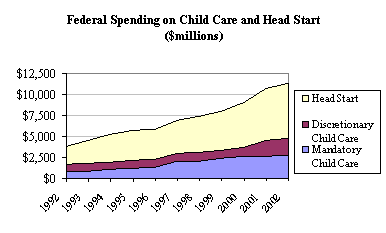
- Afghanistan
- Africa
- Budget Management
- Defense
- Economy
- Education
- Energy
- Environment
- Global Diplomacy
- Health Care
- Homeland Security
- Immigration
- International Trade
- Iraq
- Judicial Nominations
- Middle East
- National Security
- Veterans
|
Home >
News & Policies >
Policies in Focus
|
The Bush Administration's Early Childhood Initiative
Meeting Early Childhood Needs
Between Federal and State funding for early childhood care, most families are able to provide care for their young children before they start school. Over the past decade, Federal funds specifically appropriated for child care have tripled. Funding from the CCDF, TANF, and SSBG alone will provide child care assistance to an estimated 2.7 million children per month, the majority of whom are under the age of 6. This funding is expected to provide care for 72 percent of children between the ages of 3 and 5 whose parents are low income and work at least 20 hours a week. In addition, Head Start provides care to 915,000 children.

State support of and funding for child care and early childhood programs has also increased. Two decades ago, for example, only 10 States were providing pre-k programs. Today, 39 States and the District of Columbia provide support for pre-k programs. States are currently contributing about $4 billion of State funds to pre-kindergarten and child care programs. In 2001, States spent in excess of $1.9 billion for more than 765,000 children to attend pre-k. Additionally, in 2002, States provided an estimated $2 billion in State funds to subsidize child care.
Access to care, however, does not necessarily mean that children are receiving high-quality care, especially as it relates to early learning and cognitive development.
Some of the obstacles that should be addressed in order to ensure that early childhood care focuses on learning and cognitive development as well as social and emotional development include:
- Most States have limited alignment between what children are doing before they enter school and what is expected of them once they are in school;
- Early childhood programs are seldom evaluated based on how they prepare children to succeed in school; and
- There is not enough information for early childhood teachers, parents, grandparents, and child care providers on ways to prepare children to be successful in school.
The Bush Administration has developed a plan for overcoming these obstacles and for strengthening early learning for young children to equip them with the skills they will need to start school ready to learn. The Administration will strive to meet this goal by addressing needs in three key areas: Strengthening Head Start; Partnering with States to Improve Early Childhood Education; and Providing Information to Teachers, Caregivers and Parents. All children must begin school with an equal chance at achievement so that no child is left behind.


